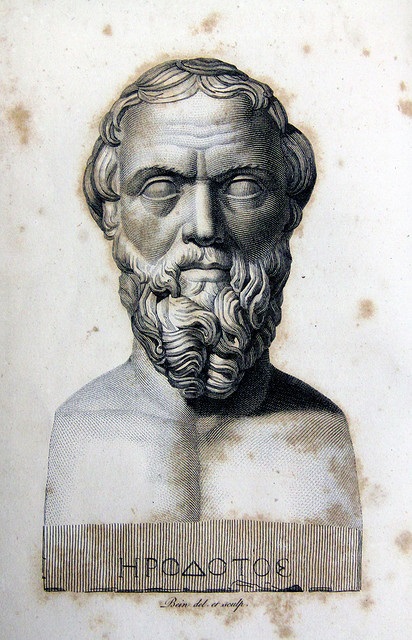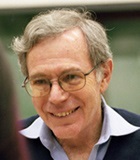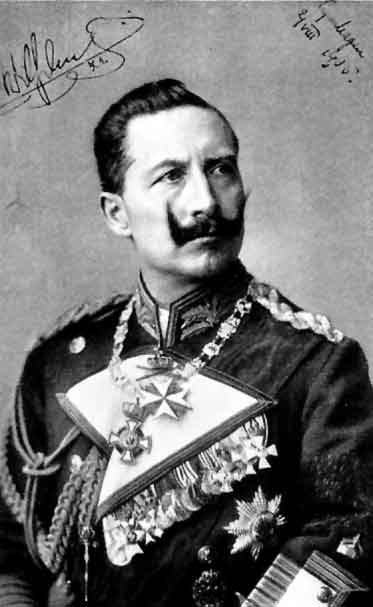‘Review note: historiography miscellany’, Honest History, 21 January 2015
Herodotus
Reaching back more than 2400 years to one of the founders of the discipline seems a good place to start. Herodotus, a Greek born in modern day Turkey, penned his thoughts around 440 BCE and he had this to say:
These are the researches of Herodotus of Halicarnassus, which he publishes, in the hope of thereby preserving from decay the remembrance of what men have done, and of preventing the great and wonderful actions of the Greeks and the Barbarians from losing their due meed of glory; and withal to put on record what were their grounds of feuds.
 Herodotus, from an edition of his works dated c. 1807 (Flickr Commons/Wyoming Jackrabbit)
Herodotus, from an edition of his works dated c. 1807 (Flickr Commons/Wyoming Jackrabbit)
Aha! Preservation and causation, two perennial concerns of historians. But there was disputation also:
Such is the account which the Persians give of these matters. They trace to the attack upon Troy their ancient enmity towards the Greeks. The Phoenicians, however, as regards Io, vary from the Persian statements.
Herodotus also showed evidence of a gendered view:
Now as for the carrying off of women, it is the deed, they say, of a rogue: but to make a stir about such as are carried off, argues a man a fool. Men of sense care nothing for such women, since it is plain that without their own consent they would never be forced away.
Masculinity as a factor in 1914
Gender and its excesses also feature in one of the many good parts of Christopher Clark’s The Sleepwalkers. Towards the end of chapter 6 (Kindle Location 6890 and following) Clark asks whether the beginning of the Great War was associated with a crisis in masculinity.
This was a play with only male characters – how important was that? Masculinity is and was a broad category that encompassed many forms of behaviour; the manliness of these particular men was inflected by identities of class, ethnicity and profession. Yet it is striking how often the key protagonists appealed to pointedly masculine modes of comportment and how closely these were interwoven with their understanding of policy.
Clark quotes protagonists from a number of countries calling for stiff backs and ‘cold blood‘, praising ‘uprightness’ and self-reliance, eschewing ‘self-castration’ and weakness against bullies.
When Bertie [British Ambassador in Paris] spoke of the danger that the Germans would “push us into the water and steal our clothes”, he metaphorized the international system as a rural playground thronging with male adolescents.
This was a Europe-wide phenomenon.
Historians of gender have suggested that around the last decades of the nineteenth and the first of the twentieth century, a relatively expansive form of patriarchal identity centred on the satisfaction of appetites (food, sex, commodities) made way for something slimmer, harder and more abstinent … Among specifically military leadership groups, stamina, toughness, duty and unstinting service gradually displaced an older emphasis on elevated social origin, now perceived as effeminate.
 Christopher Clark (University of Cambridge)
Christopher Clark (University of Cambridge)
Some decision-makers found it difficult to live up to this new standard and nervous tension and health problems resulted.
The nervousness that many saw as the signature of this era manifested itself in these powerful men not just in anxiety, but also in an obsessive desire to triumph over the “weakness”’ of one’s own will, to be a “person of courage”, as Walther Rathenau [German industrialist and bureaucrat during the war] put it in 1904, rather than a “person of fear”. However one situates the characters in this story within the broader contours of gender history, it seems clear that a code of behaviour founded in a preference for unyielding forcefulness over the suppleness, tactical flexibility and wiliness exemplified by an earlier generation of statesmen (Bismarck, Cavour, Salisbury) was likely to accentuate the potential for conflict.
Tom Griffiths on Greg Dening
Moving on some decades, we have the ANU historian, Tom Griffiths, eulogising in 2008 the late Melbourne University historian, Greg Dening. In Dening’s hand, Griffiths says, ‘History was no mere subject at university; it became a form of consciousness, a definition of humanity, a way of seeing – and
changing – the world’. Attacks on Dening for his innovative approach presaged the so-called ‘history wars’. ‘Dening had’, says Griffiths, ‘a life-long commitment to releasing voices from “the silence of aboriginality”‘.
Most of Griffiths’s lecture is about how Dening fostered ‘the creative imagination’ of his students, stressing particularly the overlaps between history and fiction. Griffiths considers the work of various fiction writers in unlocking some of the stories of the frontier clashes between whites and Indigenous Australians and concludes that ‘history and fiction are a tag team, sometimes taking turns, sometimes working in tandem, to deepen our understanding and imagination’. He looks in detail at the work of Kate Grenville in The Secret River.
Historians immerse themselves in context; they give themselves wholly and sensually to the
mysterious, alchemical power of archives. As well as gathering and weighing evidence, piece by piece with forensic intensity, they sensitise themselves to nuance and meaning, to the whole tenor of an era, the full character of a person. Their finest insights are intuitive as well as rational, holistic as well as particular; and therefore always invitations to debate. As they write, they incite; they expect disagreement and they try to furnish their readers with the grounds for offering it.
Griffiths then discusses his experiences in visiting and writing about Antarctica and concludes with some general remarks about the practice of history.
Historians welcome questions about usefulness because history is a democratic practice that
cherishes its connection with the people and the polity … History is so important, so ubiquitous, so integrated with our public and personal lives – with the very substance and art of living – that it is possible to take it for granted and overlook its power …This is why historians cultivate wonder as a technical skill. Wonder is a mechanism by which
they might make the familiar strange. I agree with the American historian, Caroline Walker
Bynum, when she says that “we write the best history when the specificity, the novelty, the awefulness, of what our sources render up bowls us over with complexity and significance”.
The whole lecture is highly recommended and it can be downloaded here.
Eric Foner on how people shape their history
The American historian, Eric Foner, is well-known for his work on the American Civil War and Reconstruction. He won the Bancroft, Lincoln and Pulitzer Prizes in 2011 for his book The Fiery Trial: Abraham Lincoln and American Slavery. In 2002 he brought out Who Owns History? Rethinking the Past in a Changing World and his Preface to that work has become well-known.
 Eric Foner (Columbia University)
Eric Foner (Columbia University)
Foner commences by quoting the novelist, James Baldwin, on how history ‘does not refer merely, or even principally, to the past’. Foner notes the interest in history in the United States during the 1990s, evident in television productions, museum exhibitions, research into long-neglected groups, and the American version of the ‘history wars’.
There is nothing unusual or sinister in the fact that each generation rewrites history to suit its own needs, or about disagreements within the profession and among the public at large about how history should best be taught and studied.
But Foner notes the long-standing American reluctance to study slavery and its impacts as well as the lack of recognition of black soldiers in memorials to the dead of the Civil War. Such omissions and elisions are not unique to the United States.
History always has been and always will be regularly rewritten, in response to new questions, new information, new methodologies, and new political, social and cultural imperatives. But that each generation can and must rewrite history does not mean that history is simply a series of myths and inventions. There are commonly accepted professional standards that enable us to distinguish good history from falsehoods like the denial of the Holocaust. Historical truth does exist, not in the scientific sense but as a reasonable approximation of the past. But the most difficult truth for those outside the ranks of professional historians to accept is that there often exists more than one legitimate way of interpreting past events.
Margaret MacMillan on how history rhymes
Margaret MacMillan is the author of The War That Ended Peace: The Road to 1914 but also of The Uses and Abuses of History, which is more about historiography and the teaching of history. Her Brookings Essay of 2013, The Rhyme of History: Lessons of the Great War, meshes the general and the particular, while making comparisons between the politics of 1914 and today.
MacMillan says that a reason the Great War still haunts us is because we still cannot agree why it broke out.
Was it caused by the overweening ambitions of some of the men in power at the time? Kaiser Wilhelm II and his ministers, for example, wanted a greater Germany with a global reach, so they challenged the naval supremacy of Great Britain. Or does the explanation lie in competing ideologies? National rivalries? Or in the sheer and seemingly unstoppable momentum of militarism? As an arms race accelerated, generals and admirals made plans that became ever more aggressive as well as rigid. Did that make an explosion inevitable? Or would it never have happened had a random event in an Austro-Hungarian backwater not lit the fuse?
MacMillan goes on to ask a crucial question, one which perhaps has particular relevance to Australia, given our alleged lack of curiosity about how we get into wars.
If we cannot determine how one of the most momentous conflicts in history happened, how can we hope to avoid another such catastrophe in the future?
 Kaiser Wilhelm II, 1905 (Wikimedia Commons)
Kaiser Wilhelm II, 1905 (Wikimedia Commons)
Current wars in the Middle East make it particularly important to understand how wars start.
The one-hundredth anniversary of 1914 should make us reflect anew on our vulnerability to human error, sudden catastrophes, and sheer accident. So we have good reason to glance over our shoulders even as we look ahead. History, said Mark Twain, never repeats itself but it rhymes. The past cannot provide us with clear blueprints for how to act, for it offers such a multitude of lessons that it leaves us free to pick and choose among them to suit our own political and ideological inclinations. Still, if we can see past our blinders and take note of the telling parallels between then and now, the ways in which our world resembles that of a hundred years ago, history does give us valuable warnings.
MacMillan goes on to look at parallels between then and now under the headings of globalisation, nationalism and sectarianism, the role of client states, the complacencies of peace, deterrents, failures of leadership and whether the United States can be a world policeman. The online version has some video of MacMillan talking plus some great illustrations, including a photo of the Kaiser and the Tsar wearing each other’s uniforms.
Using history as a resource
At the 2013 Conference of the Australian Historical Association members of the Professional Historians Association NSW talked about how history and historians can support the making of public policy. Among other useful remarks, Francesca Beddie summarised
“the five Cs” that historians bring to their work: an understanding of how things change over time; the ability to interpret the past in context; an interest in causality – not just explaining the facts but also why things happen and why it matters; contingency – recognising that nothing happens in a vacuum, but that events are connected to what has gone before; and the realisation that history, like life, is complex – not all stories can be simplified. We need to be comfortable with complexity and, through good communication, help others to become more comfortable with it too.
In similar vein from the United Kingdom, the Historical Imperative blog reports on a UK Civil Service initiative called ‘History as a resource for the future’. Those involved detect
the potential for embedding history in the training and professional development of officials. There is a good case to restore a “history core” to civil service training. As the response states, it may help attune officials to the importance of context, enable the more informed use of comparison, and encourage them to turn routinely to historical materials as they brief, advise and inform.
Doing history in different ways
Finally, it is worth noting from 2014 Paul Ham’s criticisms of ‘academic’ history, Paula Michaels’s response and John Hirst’s seven tips for writing history.